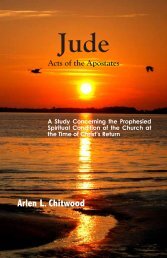Signs in John's Gospel - The Lamp Broadcast
Signs in John's Gospel - The Lamp Broadcast
Signs in John's Gospel - The Lamp Broadcast
Create successful ePaper yourself
Turn your PDF publications into a flip-book with our unique Google optimized e-Paper software.
Except a Man… (II) 89<br />
And, follow<strong>in</strong>g this time, for anyone (Jew or Gentile, no dist<strong>in</strong>ction<br />
existed) to realize a vicarious death of the firstborn, to<br />
be saved, that person had to avail himself/herself of the blood of<br />
the Paschal Lamb Who had died <strong>in</strong> their place. That person had<br />
to believe on the Lord Jesus Christ.<br />
Accord<strong>in</strong>gly, follow<strong>in</strong>g the time of the reoffer of the k<strong>in</strong>gdom to<br />
Israel, the expressions “Christians” or “the Church of God” would<br />
be the proper term<strong>in</strong>ology used relative to the saved. Follow<strong>in</strong>g<br />
this time, “Jew” and/or “Gentile” would refer to the unsaved<br />
rather than, as <strong>in</strong> certa<strong>in</strong> previous times, to two groups of saved<br />
<strong>in</strong>dividuals.<br />
(Note though that the same dist<strong>in</strong>ction and term<strong>in</strong>ology used follow<strong>in</strong>g<br />
the close of the reoffer of the k<strong>in</strong>gdom to Israel — “Christians,”<br />
“the church of God” — was also used dur<strong>in</strong>g the time of the reoffer [Acts<br />
11:26; I Cor. 10:32]. But, dur<strong>in</strong>g this time, because those to whom the<br />
offer was be<strong>in</strong>g extended were not part of the Church of God, though<br />
saved [Jews, compris<strong>in</strong>g the nation at large but refus<strong>in</strong>g to believe that Jesus<br />
was the Christ, their Messiah, the One Who would rule and reign], the<br />
dist<strong>in</strong>ction and term<strong>in</strong>ology as seen <strong>in</strong> Rom. 1:16 [“Jew” and “Greek<br />
(referr<strong>in</strong>g to saved Gentiles)”] had to exist as well.)<br />
John’s <strong>Gospel</strong><br />
John’s gospel is where the matter of be<strong>in</strong>g brought forth from<br />
above, out of God, is <strong>in</strong>troduced, <strong>in</strong> so many words, <strong>in</strong> the New Testament.<br />
John though doesn’t <strong>in</strong>troduce someth<strong>in</strong>g new <strong>in</strong> Scripture.<br />
He simply uses different term<strong>in</strong>ology to describe someth<strong>in</strong>g which<br />
should have been well-known by the Jewish people, for a br<strong>in</strong>g<strong>in</strong>g<br />
forth from above, a br<strong>in</strong>g<strong>in</strong>g forth out of God, is seen over and over<br />
throughout not only Israel’s history but Scripture as a whole.<br />
And an expected understand<strong>in</strong>g of this truth from Scripture<br />
would have been particularly true for Israel’s religious leaders.<br />
This is why Nicodemus <strong>in</strong> John 3:1ff would have been expected<br />
to immediately recognize that to which Christ referred (cf. John<br />
7:45-52), which accounts for Christ’s sharp rebuke when he failed<br />
to do so.<br />
<strong>The</strong> truth of the matter concern<strong>in</strong>g exactly what is <strong>in</strong>volved



